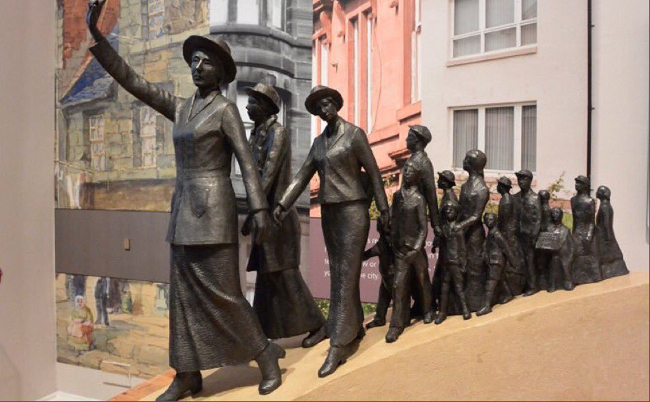Aoife Deery: Reflections on women in the housing sector for International Women’s Day
Every day Shelter Scotland fights for the right to safe, secure and affordable housing and to mark last week’s International Women’s Day, Aoife Deery took the opportunity to reflect on the work of the women, past and present, who have helped to improve housing for other women in Scotland.

The theme for International Women’s Day 2019 is “think equal, build smart, innovate for change” and rarely is this more relevant than for us in the housing sector.
There is no way this blog could be written without mentioning Mary Barbour. Needing little introduction, Mary Barbour is best known for organising the 1915 rent strikes in Govan and was pivotal in forming the South Govan Women’s Housing Association. She went on to be the chairperson of the Glasgow Women’s Welfare and Advisory Clinic whilst in the role of Bailie for the city. Her leadership, tenacity and contribution to the progress of women’s housing and welfare rights in a time where these were very much overlooked, continues to inspire those of us in the housing sector and will do so far into the future.
Housing conditions, advocacy and rights have all improved since Mary Barbour’s day, but even now we need the same spirit and leadership to continue progressing housing rights for women. We are lucky that there are so many women doing just this in the housing sector and it’s difficult to pinpoint just a few for this blog.
In terms of politics, the ongoing role of politicians and elected members in passionately pushing for progress for their constituents is invaluable. This was demonstrated by Kezia Dugdale MSP in the Ending Homelessness Together debate at the Scottish Parliament in November. She described the terrible conditions of some emergency accommodation in her area and implored the Housing Minister to speed up progress on addressing “the state of temporary accommodation that my council tax has paid for, which keeps landlords rich, and keeps the poorest people in the most destitute situations”. As a sector, we rely on this honest and open conversation in parliament about the reality of people’s living conditions in order to push for improvement and change.
Unfortunately, homelessness is still very much a gendered issue, and this International Women’s Day and every other day, we think of the women we work with for whom the housing sector still does not work and where change is most needed.
In particular, domestic abuse is still a leading cause of homelessness amongst women and we are currently working with CIH Scotland and Scottish Women’s Aid to improve how the sector responds to domestic abuse.
We also know that women are also disproportionately affected by welfare reform, and we are concerned about the link between this and the rising numbers of families and children using temporary accommodation in Scotland. We have extensive evidence of working with lone mothers with children who have become homeless due reasons including the benefit cap, and who continue to be allocated totally unsuitable and sometimes even unsafe temporary accommodation for long periods of time.
So, women (and young women in particular) are more likely to find themselves at risk of homelessness outwith their control and therein lies the problem – but what can we do? The only answer is that we must redesign the system so that women’s needs are better recognised and accommodated for, and homelessness prevented. Like in Mary Barbour’s time, women’s voices are central to this change, and we’ve begun to make this happen by working with and involving women who have experienced homelessness or bad housing in our policy and campaigning work. Recently, we’ve facilitated women to speak about their experiences in the Scottish Parliament, at our annual homelessness conference and at events during our 50th year. We’re also developing our Time for Change approach within Shelter Scotland, which is another way that people with lived experience can get involved and influence our work. We appreciate that it takes a lot for these incredible women to do this, and this International Women’s Day, we push ourselves to keep improving how we make women’s voices heard, so that the system can no longer ignore them.
This article was originally published on the Shelter Scotland website.









